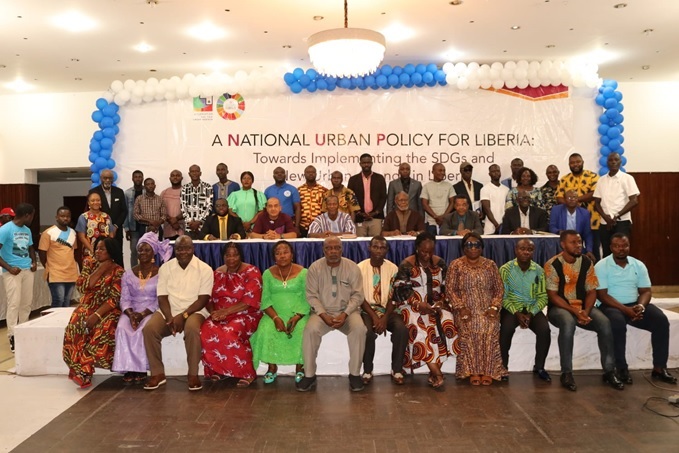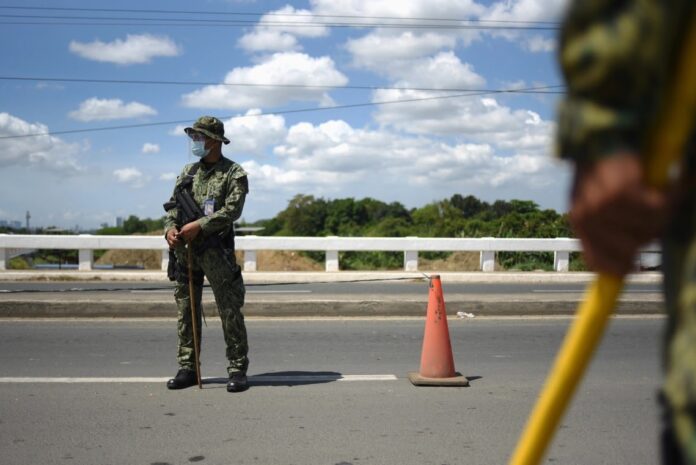-As Deputy Internal Affairs Minister Calls on Liberians to Take Ownership
MONROVIA – The Government of Liberia through the Ministry of Internal Affairs, in collaboration with the United Nations Habitat (UN-Habitat), has validated the country’s first-ever national urban policy; with the Minister of Internal Affairs rallying all stakeholders to take ownership of the policy.
With support from Booyoung and UN-Habitat, the Government of Liberia developed a participatory National Urban Policy (NUP) to support its national vision that seeks to move Liberia to a middle-income status by 2030. The policy development was a broader endeavor to support poverty reduction through integrating urbanization into national development policies and as well developing sustainable and resilient Liberian cities.
Addressing stakeholders at the validation meeting of the NUP recently, the Deputy Minister for Administration, Ministry of Internal Affairs, Momolu Johnson, called on Liberians to give their fullest support, collaboration, and coordination to the implementation of the policy as well as take ownership to make sure the sustainability of a promising urban development framework for the country.
“We are very grateful to UN-Habitat, all ministries and agencies, civil society organizations, youth groups, women groups, disabled groups, and all other national and international actors that provided technical support during the Feasibility, Diagnostic, and Formulation Phases. Specifically, we want to acknowledge the significant contributions made by UN-Habitat’s, Policy, Legislation, and Governance Section for their technical support and Cities Alliance for underwriting the cost during the first two phases of the project and a big thank you to our new funding partner Booyoung for continuing the great work that was started some years ago, Deputy Internal Affairs Minister emphasized.
The formulation process was launched by former President Ellen Johnson Sirleaf at the first National Urban Forum in 2015. Since then, the NUP process has become a tool for the implementation of the New Urban Agenda (NUA) and the Sustainable Development Goals (SDGs), especially Target 11.
According to Deputy Johnson, the NUP is “a coherent set of decisions through a deliberate government-led process of coordinating and rallying various actors towards a common vision and goal that will promote more transformative, productive, inclusive and resilient urban development for the long term.”
The Deputy Internal Affairs Minister intoned that the development of the policy has formed part of a series of plans leading towards the goals of Vision 2030, and will further align with the country’s national policy; the Pro-Poor Agenda for Prosperity and Development (PAPD), the African Union Agenda 2063 and the Global Sustainable Development Goals (SDGs) particularly Goal 11.
He said the importance of developing a National Urban Policy for Liberia is first to evaluate the current urbanization opportunities and challenges and; thereafter formulate long and short-term solutions to leverage opportunities and mitigate possible challenges for a better and prosperous future.
Deputy Minister Johnson continued: “A coordinated effort from the Government, led by the Ministry of Internal Affairs in collaboration with other relevant stakeholders, provides the best opportunity for achieving resilient and sustainable urbanization; by linking sectorial policies, connecting national, regional, and local government policies, and strengthening urban, peri-urban and rural links through integrated territorial development.”
According to the NUP’s concept note, the development of the policy for Liberia is expected to coordinate the work of different sectors, establish incentives for more sustainable practices, and spur a balanced system of cities and towns through strengthening urban-rural linkages and equitable resource allocation. This will not only help reduce urban and territorial disparities within and among regions but also promote institutional collaboration and policy coherence.
The NUP concept note further indicated that Liberian cities are urbanizing at a fast rate through population growth. A United Nations projection shows that by 2050, Liberia’s urban population will have almost tripled to 6,689,000. Basic services in cities are substandard and rarely available. Opportunities lie in understanding the resulting issues and the increase in service demands, described in the North Central and South East Regional Workshop Reports, and the related benefits of implementing principles of the SDGs and the New Urban Agenda as a response to urban growth.
The concept note further noted that there has been a disproportionate rate of urbanization and urban primacy; Monrovia, the capital, is home to 40 percent of the national population and a commercial, international trade, and economic nucleus of the country. As a result, challenges generated by unplanned urbanization are significant and threaten to impede national development. As the location of Liberia’s central government, Montserrado County is the beneficiary of most of the country’s resources.
The systems of cities in Liberia are changing, previous legislature does not assign duties and responsibilities to cities, and however, as common practice city governments have been responsible for waste management, cleanliness, and beautification. Larger cities, such as Monrovia and Paynesville, have developed City Ordinances giving themselves more powers, duties, and responsibilities, which have been difficult to enforce or carry out with limited financial resources.
Some participants and stakeholders at the validation meeting included: Monrovia City Mayor, Jefferson T. Koijee, Liberia representatives from the Institute of Architect Engineers Society of Liberia, the National Disaster Management Agency, the Liberia Land Authority, Ministry of Public Works, Ministry of Finance and Development Planning and members of the Legislature Houses Committees on Internal Affairs as well as all members Council of City Mayors.







